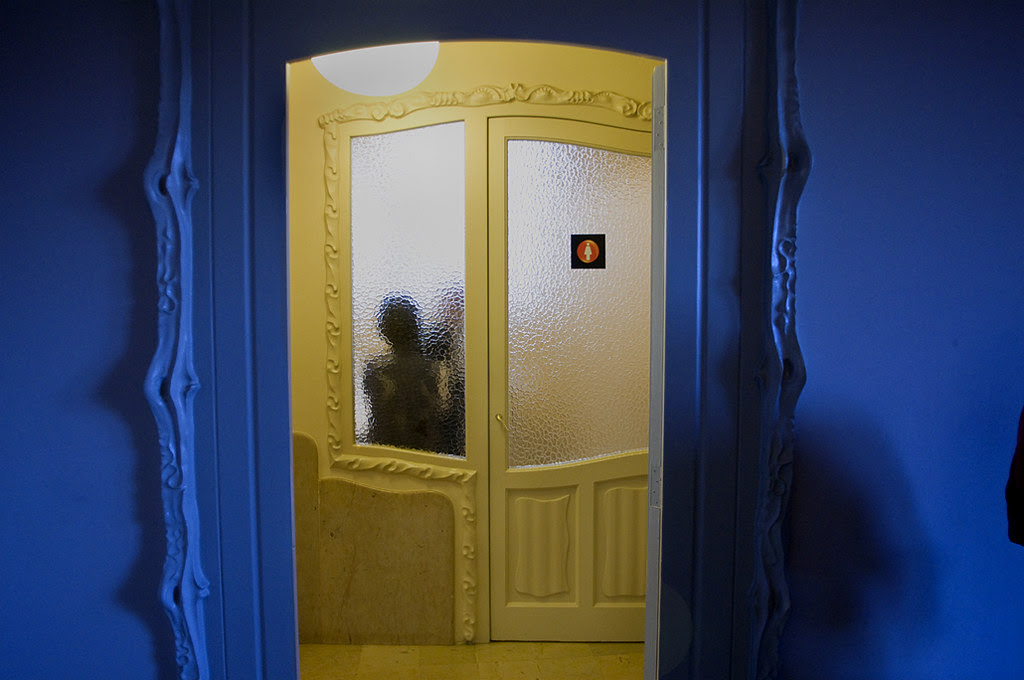.

Couple, Madrid: photo by Chuck Patch, 2 May 2012
For love -- I would
split open your head and put
a candle in
behind the eyes.
Love is dead in us
if we forget
the virtues of an amulet
and quick surprise.
Robert Creeley: The Warning, from For Love (1962)

Street conversation, Berlin: photo by Chuck Patch, 2012, posted 16 January 2013

Wait until you see the whites of their eyes (Bourbon Street, New Orleans): photo by Chuck Patch, 21 October 2006

Street scene, Hampden, Baltimore: photo by Chuck Patch, 11 June 2011

Harry Shearer and Judith Owen as Newt and Callista Gingrich, New Orleans, Mardi Gras 2012: photo by Chuck Patch, 21 February 2012

Street fair, Malmo, Sweden: photo by Chuck Patch, 19 August 2012

Lanier Heights, Washington, D.C.: photo by Chuck Patch, 18 August 2006

French Quarter, New Orleans: photo by Chuck Patch, 24 February 2009

Gaudi, la Pedrera, Barcelona: photo by Chuck Patch, 1 May 2012

Street scene, Copenhagen: photo by Chuck Patch, 22 August 2012

May 2 Celebration, Madrid: photo by Chuck Patch, 2 May 2012

House, night, New Orleans, Mardi Gras 2012: photo by Chuck Patch, 18 February 2012

May 2 Celebration, Madrid: photo by Chuck Patch, 2 May 2012

House, night, New Orleans, Mardi Gras 2012: photo by Chuck Patch, 18 February 2012

Union Station, Washington, D.C: photo by Chuck Patch, 22 June 2009



12 comments:
once again Tom, wonderful juxtapositions with the photos and poem, brought a whole new perspective to it
good news, Michael, thanks
Harry Shearer (fifth photo) is a pretty funny guy who has a thing about showing up at events, though not always as Newt Gingrich.
(You may remember his voice acting from The Simpsons.)
The toxic sameness is everywhere. It’s the most prominent feature in a worldwide culture (mass cult?) that still talks up the supremacy of the individual. Diversity? In Berlin or New Orleans or Madrid or East Wagga Wagga it’s all being ground down to the same featureless beige-gray machined blankness. Everything’s sold to you whether you can afford it or not, or even want it. The Economy, the almighty economy, needs you to go out there and engage in mindless acts of commerce. “A quick surprise” is maybe the only antidote left us: life and love in the risk of something spontaneous. There was a radio spot I once heard, promoting skiing at Incline, at Lake Tahoe. “Safe, exciting Incline,” the announcer intoned brightly, schizophrenically. To be titillated yet secure is the dream of the impotent consumer.
I was disturbingly, unpleasantly "off-put" by this all day until I came to terms with the fact that the knocking off-center was central to the poem and Chuck Patch's very impressive work. For a while I got hung up on the fact that I kind of objected to the Harry Shearer (and wife) photo -- Newt and Calista are such easy targets, even if they're legitimate ones -- but then remedied this by clicking on your link and finding the clip of Harry appearing on Fernwood 2-Night as the president of the Tom Snyder Appreciation Society, which has had me laughing for quite a while. Curtis
The poem and the photos engage, or at least appear to be engaging, certain manifestations of an emotion famously complicated, rich, various, dark, strange... and inexplicable.
The poem is hard to forget once one has read it and taken it in.
Poetry rarely shocks, in any real way.
In conversations between February 1991 and March 1992 preparatory to a book we were doing about his life and work (TC: Robert Creeley and the Genius of the American Common Place, New Directions 1993), Creeley recounted the personal trials of his beginning years as a writer, identifying an early crisis of subjectivity, during which, he said, he had felt constrained to write from "inside the self" or "inside the emotion" -- an isolating perspective, as he would come to think in later years when his aim had become an attunement of words and feeling to a more "human" or "common" measure.
He would identify the trials of the experiencing subject at the center of the action in the early poems as characteristic of a "self-imprisoned" Puritan temperament.
"Puritan self-torment, the poet has written, may achieve a highly sophisticated formality that is the ultimate epistemological invention of a culture responsible for the proposition 'that pain was perhaps the most formal means that society had evolved for the experience of itself.'"
Meanwhile...Newt Gingrich, being a public figure, and a somewhat larger-than-life specimen of the class at that, did seem a fair subject for the very mild bit of satire seen in that Chuck Patch Mardi Gras photo.
After all, it wouldn't be the first time -- recalling the angry stay puft marshmallow man.
I thought I’d seen it all but really, sitting on your ass wearing cool sunglasses on the steps of your porch holding in your lap what looks like a Chihuahua, all the while balancing on your head a tot in a lawn chair in suburban Hampden, Baltimore—now that would’ve surprised even that sharp veteran observer Creeley!
love this!
A comic violence; ostensively brash. You have to keep coming back. The notion of the amulet unnerves me.
Love comes into question. Creeley's stripped it of that dull quotidian patina. It feels like it won't steady up in your head.
"Love comes into question. Creeley's stripped it of that dull quotidian patina. It feels like it won't steady up in your head."
It's this stripping away of the sentimentality, the automatic cliché banality that is the endemic weakness of the "love poetry" genre, that brings people up short, and maybe even prompts thought, with this unsettling little provocation.
What an amazing series of photos--and poem!
Thanks, Nin.
A great American poet, a great American street photographer.
One is moved to gratitude.
For all the talk that goes on, when the smoke clears we have so very few artists of this calibre.
Post a Comment